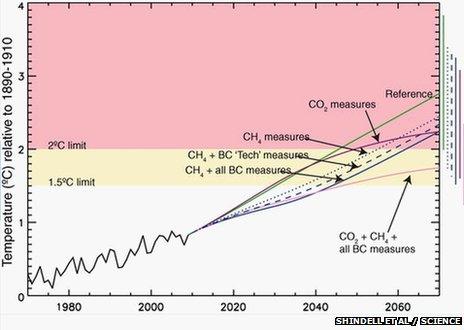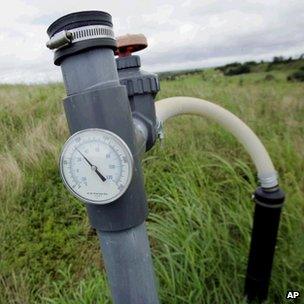Short-term climate fix risks blanking CO2
- Published
- comments

Modernising Africa's cooking stoves would save lives, money and emissions
The US is leading a new six-nation initiative, external aimed at curbing climate change by tackling short-lived warming agents including methane, black carbon and hydrofluorocarbons (HFCs).
Bangladesh, Canada, Mexico, Sweden and Ghana are signed up, and the UN Environment Programme (Unep) is going to co-ordinate the venture.
Precisely how it's going to work is unclear.
But based on existing experiences around the world and on the priorities of some of the nations involved, measures are likely to include changing farming methods to reduce methane emissions from rice paddy, investing in efficient and clean cooking stoves for Africa and South Asia, and upgrading landfill sites and wastewater treatment facilities to capture methane.
Methane is a more potent warming gas than carbon dioxide, molecule for molecule; but its lifetime in the atmosphere is in the order of a few decades, rather than centuries.
Black carbon - a component of soot - increases the Earth's absorption of solar energy.
Academic backing for the idea of tackling these substances urgently has come in a number of reports, but two particularly spring to mind.
Last year, Unep released a detailed analysis, external concluding that "a package of 16 measures could, if fully implemented across the globe, save close to 2.5 million lives a year; avoid crop losses amounting to 32 million tonnes annually and deliver near-term climate protection of about half a degree C by 2040".
(The life-saving aspect derives mainly from the reduction in air pollution achieved by cleaning up cooking stoves and urban transport.)
The other report was a paper in Science journal, external last month from a group of mainly US academics led by Drew Shindell, which reached broadly similar conclusions - and said these curbs would be affordable.
Still, the new initiative, the Climate and Clean Air Coalition to Reduce Short-Lived Climate Pollutants, hasn't been greeted with universal warmth, external; and there are two inter-related reasons why.
The first is that according to the science, tackling short-lived climate pollutants doesn't prevent global warming - it just delays it.
The main graph in the Shindell Science paper explains this clearly.

Tackling black carbon (BC) and methane but not CO2 just delays warming, the Science paper found - it doesn't prevent it
They conclude that implementing all the recommended measures for methane and black carbon but doing nothing about carbon dioxide delays exceeding the oft-touted 2C threshold for temperature rise - but it still gets exceeded in the end.
By contrast, tackling CO2 and not doing anything about the short-lived substances sees more warming in the next few decades - but beyond about 2060, it's more effective than tackling the short-lived agents.
And it's worth emphasising that the CO2 reduction pathway that the paper used - an International Energy Agency scenario, external that would stabilise greenhouse gas concentrations at the equivalent of 450 parts per million of CO2 (450ppm CO2e) - is regarded by many as too lax by far.

Recovering methane from landfill sites is a tried and tested way of reducing emissions
The essential takeaway sentence from the entire paper on the relationship between tackling CO2 and tackling the short-lived agents must be this: "Implementing both substantially reduces the risks of crossing the 2°C threshold".
And the essential word in that sentence must be "both".
The Oxford University climate scientist Myles Allen is far more pithy.
"Given that we don't have any prospect of a credible plan to reduce CO2 emissions, the suggestion that immediate cuts in methane and black carbon will reduce the risk of dangerous long-term climate change is pure fantasy," he comments.
And this leads me to the second reason why the new initiative isn't being welcomed with completely open arms; because it could produce the impression that enough is being done.
The US has history here, having established the Asia-Pacific Partnership on Clean Development and Climate, external (by some spooky parallel, also a six-nation bloc) and later the Major Economies Forum, external.
The publicity at the time of their formation said they weren't designed to replace the UN climate convention process but to complement it.
The reality was rather different, with elements of the controversial 2009 Copenhagen Accord, external taken straight from the MEF blueprint rather than UN negotiating text, and a number of important nations finding it was the way they preferred to do business.
Now the line has surfaced again, with US Secretary of State Hillary Clinton declaring the new coalition will "complement but not supplant" the main international efforts to curb emissions.
On a pragmatic basis, some of the measures on black carbon and methane are doable, affordable and bring real health and development benefits as well, particularly on clean cooking stoves.
But emphasising short-term warmers in the absence of meaningful action on CO2, to some observers, smacks of short-term politics and an unwillingness to get to grips with the main issue.